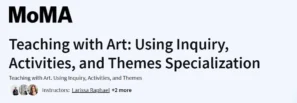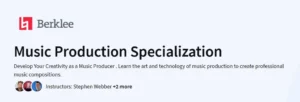What you will learn in Piano Techniques for Modern Music Course
- Contemporary piano chord voicings
- Pop/R&B groove development
- Improvisation frameworks
- Comping patterns for ensemble playing
- Basic jazz harmony applications
- Studio recording techniques
- Keyboard sound design
Program Overview
Modern Harmony Foundations
⏱️ 2 weeks
- Covers extended chords (7ths, 9ths, sus4), inversions, and voice leading.
- Includes chord progression analysis from hit songs.
Groove Development
⏱️ 2 weeks
- Focuses on rhythmic comping patterns, syncopation, and left-hand bass techniques.
- Features genre-specific groove studies.
Improvisation Tools
⏱️ 2 weeks
- Teaches pentatonic/blues scales, motif development, and solo construction. Includes play-along tracks for practice.
Production Techniques
⏱️ 2 weeks
- Examines MIDI programming, keyboard effects, and doubling strategies.
- Features DAW workflow demonstrations.
Get certificate
Job Outlook
- Professional value: Essential for session players
- Salary potential: 50200 per studio hour
- Industry demand: Core skill for music producers
- Certification benefit: Berklee alumni network access
Explore More Learning Paths
Enhance your piano mastery and broaden your musical creativity with these thoughtfully selected programs designed to support modern performers, songwriters, and beginners alike.
Related Courses
Piano Techniques for Modern Music Course – Strengthen your contemporary piano skills with techniques that improve rhythmic precision, harmony, and stylistic versatility.
Piano for Singer-Songwriters: Write Songs and Perform Live Course – Learn to accompany yourself confidently, write expressive songs, and perform live using foundational piano skills tailored for singer-songwriters.
Beginner Piano Course – Build the essential fundamentals of technique, notation, and musicality—perfect for those just starting their piano journey.
Related Reading
Support your practice and artistic growth with structured skill-building strategies:
What Is Performance Management? – Discover how systematic improvement and goal-setting can help musicians progress consistently and refine their craft.
Specification: Piano Techniques for Modern Music Course
|
FAQs
- You’ll develop healthy piano-playing habits, including posture, breathing, finger placement, and hand position as foundational skills.
- You’ll build finger independence and arm movement, learning to play smoothly across the keyboard with minimal tension and expressive dynamics.
- The course teaches wrist technique and how to play chord tones comfortably, improving speed and hand independence.
- You’ll master pedal technique, coordinating hands and feet to bring virtuosity and expression into both classical and contemporary repertory.
- The course also shows you how to implement a practice journal and recording strategy, helping to organize effective, sustainable practice routines.
- The course is organized into five modules, with focused lessons on posture, finger and arm technique, wrist technique, and pedaling.
- Recommended pacing is 1 week at about 10 hours, though it’s fully self-paced and flexible.
- Each lesson includes a mix of videos, readings, peer-reviewed assignments, and discussion prompts, making learning interactive and reflective.
- The “Welcome” module (~156 minutes) introduces course goals, logistics, and practice mindset.
- Total engagement across all modules is approximately 12–15 hours, aligning well with focused short-term study or incremental practice.
- Yes—it’s a beginner-level offering, especially useful for learners returning to piano or starting a healthy technical foundation.
- It covers essentials like posture, hand positioning, and basic chord progressions, making it accessible to early learners.
- You’ll learn how to prevent tension and injury from the start, which supports longevity and comfort in playing.
- With practical segments like breathing and healthy habits woven into technique lessons, it’s way more approachable than advanced method books.
- The course’s gentle progression makes it ideal for building confidence and technique without pressure.
- This course is led by Zahili Gonzalez Zamora, associated with Berklee College of Music, lending strong professional and academic credibility.
- Offered through Coursera and often included with Coursera Plus, it reflects Berklee’s well-regarded approach to modern music education. Coursera
- It has been well-received—14,372 learners enrolled with an impressive 5.0 average rating from 22 reviewers.
- Learner testimonials are glowing, for example: “Great techniques for getting back into playing the piano” and “I have learnt a lot.”
- The combination of Berklee’s reputation and the course’s high ratings makes it a trustworthy choice for musical development.
- Yes—you can earn a shareable certificate of completion, which can be added to LinkedIn, your résumé, or performance portfolio.
- You have the option to audit the course for free to access most materials, or purchase the full Certificate experience to unlock graded assignments and certification.
- Coursera’s flexible schedule allows you to learn at your own pace, with the ability to reset deadlines as needed.
- Financial aid may be available through Coursera if cost is a concern, and refunds are offered per their policy timeline.
- The format supports varied learning styles—whether you’re time-constrained or aiming for deep, reflective practice.





